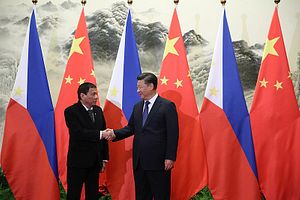Philippine President Rodrigo Duterte met with his Chinese counterpart Xi Jinping in Beijing on Thursday. It was the eighth such meeting between the two leaders since Duterte assumed office in 2016, as well as Duterte’s fifth visit to China.
As the frequency of those exchanges suggests, Duterte has gone out of his way to embrace China-Philippines relations, part of his strategy for diversifying Manila’s foreign policy partners. The biggest obstacle to warmer ties, however, has always been Manila and Beijing’s overlapping claims in the South China Sea (where Brunei, Malaysia, Taiwan, and Vietnam also have claims). Duterte’s attempts to thread the needle between defending Philippine sovereignty and stoking the fires of relations with Asia’s biggest economy have led to criticism at home.
China’s own actions haven’t helped. Over the summer, tensions spiked when a Chinese fishing vessel rammed and sank a Filipino boat, then left the scene without bothering to rescue the endangered crew members. There have also been reports of Chinese military vessels crossing into the Philippines’ territorial sea. Amid those developments, and resulting public backlash in the Philippines, even members of Duterte’s own administration have been taking a harder line against China.
“The bottom line is what they’re saying does not match their actions,” Defense Secretary Delfin Lorenzana said in July. “They want peace in the South China Sea, blah blah blah, but it does not reflect what they are doing on the ground.”
Rising anger at the perceived weakness of his China policy pushed Duterte to announce that, during this week’s visit, he would at long last raise the topic of a 2016 international arbitration ruling on the South China Sea that went against China. The case, initiated by Duterte’s predecessor, resulted in a near-complete victory for Manila – most notably the repudiation of China’s claims to “historic rights” over features in the Philippines’ exclusive economic zone. Beijing, however, has consistently refused to recognize the ruling, and Duterte had – until now – also declined to bring it up, despite polls showing that nearly 90 percent of the Philippine public want the topic discussed with China. Finally, last week the Philippine president pledged to raise the issue in his talks with Xi.
Even then, Philippine Ambassador to China Jose Santiago Santa Romana was quick to point out how cautious Duterte’s approach would be. Duterte is “not coming here to impose it [the ruling] on China. He’s not coming here to provoke the Chinese. He’s coming here to exchange views, to understand where the differences lie,” Santa Romana told reporters in Beijing.
From the Chinese perspective, Duterte has been a welcome partner. He not only downplayed the arbitral ruling, but actively courted Chinese investment and repeatedly gives rhetorical shrugs to the notion that Manila must stand up to Chinese encroachment in the South China Sea. The two sides also signed a preliminary agreement last November that could open the way for joint oil and gas exploration in the South China Sea, long a hot button issue – many in the Philippines fear that agreeing to joint exploitation is tantamount to acknowledging the legitimacy of Chinese claims to resources that should be the Philippines’ alone. Notably, Duterte has also said he would discuss progress on such joint exploration during his China visit.
Chinese readouts from the Duterte-Xi meeting on Thursday were predictably positive. Xi made a vague acknowledgement of “profound and complex changes” in the “international and regional situations,” but also insisted that “peace, development, cooperation and mutual benefit are still an irresistible trend of the times.”
On the South China Sea issue specifically, Xi called for both China and the Philippines to push forward on a Code of Conduct currently under negotiation between China and the 10 ASEAN member states. Calling the CoC a “pioneering work” for establishing rules and order in the South China Sea, Xi said the two sides should aim to see the agreement concluded by 2021 or earlier.
As for joint resource exploration, China announced that the two sides had established the intergovernmental steering committee called for by the November 2018 memorandum of understanding, as well as a working group of relevant companies. China and the Philippines will “push for joint exploitation to see substantial progress as quickly as possible,” the readout said.
Duterte will be in China until September 1.

































